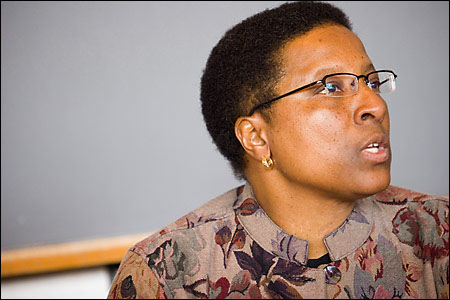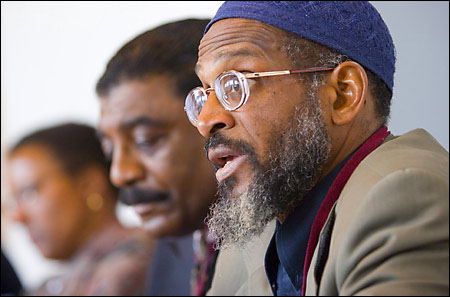HDS panel IDs crises in African-American community
From Mississippi to Massachusetts, panelists present an array of grievances

One predicament per speaker seemed to be the rule at the Harvard Divinity School (HDS) as ministry and service leaders gathered to discuss African-American religious responses to crisis. This overflow of emergencies answered a – perhaps inevitable – question posed by a member of the audience. Q: Why don’t people get involved? A: They’re overwhelmed by the sheer number of crises.
The setting was the “A Time to Speak” conference at HDS on Friday (April 7) and the speakers were part of a panel titled “The Elders Speak.”

Just back from a trip to Ocean Springs, Miss., Cheryl Giles reported on post-Katrina efforts to rebuild communities and help people whose emergency benefits are dwindling. Giles, who is the Francis Greenwood Peabody Professor of the Practice in Pastoral Care and Counseling at the Divinity School, told the story of Clara.
Clara has lost her job as a financial aid adviser, her home, her middle-class life. Since the hurricane, she’s been living in a one-bedroom apartment with her five children, including a schizophrenic, diabetic daughter. The family had been living off of FEMA’s emergency unemployment payments, but these have run out. Desperate, Clara ventures to Lutheran Disaster Relief Services seeking assistance.
Also in this issue:
Kennedy School students help New Orleans rebuild – and regroup
Giles, who is visiting the organization, hears Clara’s story. Confident that Clara both needs and deserves assistance, she refers the case to a relief services staff member, who initially refuses to help Clara unless she finds employment – perhaps at McDonald’s. Clara reacts with anger to this suggestion. Giles intervenes and they arrange for the relief services to pay for some of Clara’s child’s health care costs.
What she witnessed, Giles asserted, was an act of racism. Despite being well intentioned, the relief services staff member, said Giles, was unable to understand why her suggestion was insulting to Clara.
Giles suggested that disaster relief workers need to be trained in “cultural competence.” She also bemoaned the lack of job placement for professionals, and the lack of coordinated disaster relief from faith-based African-American communities.
The Rev. Hurmon Hamilton talked about efforts to provide health insurance to those lacking it. With an estimated 550,000 Massachusetts residents without health care, he said this met his definition of crisis, which is any issue that arises to such a level that it poses a serious threat to public life and thereby requires an organized public response.
Hamilton, who is pastor of the Roxbury Presbyterian Church, is also president of the Greater Boston Interfaith Organization, which has been working on a ballot initiative to provide health care insurance to most or all of the uninsured in Massachusetts.
The roots of crisis in the African-American community, said Omar Abdul-Malik, research fellow in Islamic Studies, extend back to the moral leadership found in this country in the 17th and 18th centuries. The founding fathers, he said, adopted a reconfigured version of the Old Testament Exodus saga with the new world settlers placed in a starring role as God’s new chosen people fleeing the oppression of the evil English monarch. Repercussions of this view were felt by the Native Americans and the African slaves, Abdul-Malik added, neither of whom were considered to count among the “chosen.”
By contrast, according to Abdul-Malik, black slaves long viewed themselves as God’s chosen people, not in the promised land, but in Egypt, i.e., America. “Under a contemporary evil pharaoh who was more than equal of his Old Testament counterpart,” he said.
If African Americans are waiting on God for rescue and retribution, asked Abdul-Malik, “What do we do in the meantime?” The answer, he said, is to be found in both the Quran and the Bible, and that is what he termed an “operational definition of faith.”
“Faith,” he said, “requires public service initiatives to assist the poor, faith requires human capital accumulation and economic development, and faith also requires transcendence to get through times of instability and hardship.”
Somewhat similarly, the Imam Taalib Mahdee felt that the crisis facing the African-American community is the enslavement of people’s souls. He said that the African-American community needed to start thinking of itself as a collection of human beings, rather than simply as a collection of black people or African Americans. “Anything else other than that, in my opinion,” he said, “will keep us in slavery.”
The Rev. Ray Hammond, a trained physician, brought his medical perspective to bear on the definition of crisis: the turning point in a disease for good or evil, but usually for the better.
Great emergencies and crises, said Hammond, show us how much greater are our bodily resources than we had supposed. And, he added, they were inevitable: “You live this life long enough … you’re going to have a crisis.”




